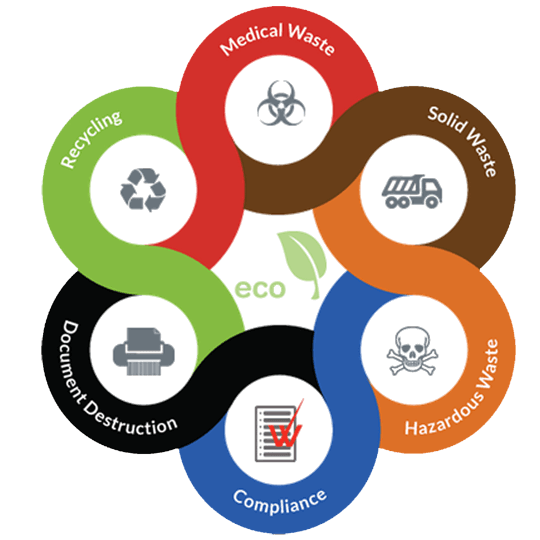Navigating Medical Garbage Disposal: Essential Solutions for Health Care Facilities
In the detailed landscape of health care procedures, the administration of medical waste is an essential facet that demands thorough focus. Medical care facilities, whether little clinics or large hospitals, are delegated with the obligation of handling, treating, and taking care of a large array of clinical waste streams. The complexities associated with navigating through the regulatory requirements, making certain correct waste partition, and implementing secure collection and transport processes are extremely important. Comprehending the crucial services that sustain medical garbage disposal is not just a matter of conformity yet additionally a fundamental part in guarding public wellness and ecological wellness. The details of this procedure are important for medical care centers, and the know-how offered in this realm plays a pivotal role in preserving the honesty of health care systems.
Regulatory Conformity Support
For medical care facilities, ensuring regulative compliance support is necessary to preserve appropriate handling and disposal of clinical waste. By partnering with regulatory conformity experts, healthcare facilities can remain up-to-date on developing guidelines, minimize dangers associated with improper waste disposal, and inevitably contribute to a more secure and extra sustainable setting for all.
Waste Partition Guidance

Health care centers should offer clear standards and training to personnel on exactly how to segregate waste effectively. This includes separating general waste from unsafe products such as sharps, contagious waste, pharmaceuticals, and chemical waste. Color-coded containers, tags, and signs are typically used to help in waste partition techniques. Normal audits and monitoring of waste segregation procedures are necessary to recognize any type of concerns and make necessary renovations.
Collection and Transport Solutions

Correct collection and transportation solutions are important components of the clinical waste disposal process in healthcare centers. These services make certain that unsafe materials are taken care of safely and in compliance with policies to safeguard both the environment and public health and wellness. Health care centers depend on specialized waste administration firms to give efficient collection and transportation solutions customized to their needs.
Medical waste collection involves segregating various types of waste at the factor of generation, utilizing color-coded bags or bins to distinguish between general, dangerous, pharmaceutical, and various navigate here other waste streams. As soon as accumulated, the waste is transferred in committed vehicles equipped to handle harmful materials securely.
Therapy and Disposal Solutions
In the world of medical garbage disposal for healthcare facilities, after the important stage of collection and transport services, the emphasis shifts in the direction of applying efficient therapy and disposal options. Therapy remedies commonly involve procedures such as autoclaving, which utilizes heavy steam under stress to decontaminate the waste. This technique is typically utilized for transmittable waste that needs to be provided non-hazardous prior to disposal. Another common therapy approach is incineration, where waste is subjected to heats in regulated settings to minimize its volume and eliminate microorganisms.
Disposal remedies incorporate the last step in the medical waste monitoring procedure. Recycling and source recovery are also acquiring traction as sustainable disposal options for specific kinds of medical waste materials.
Reliable treatment and disposal options are extremely important in making sure conformity with guidelines and safeguarding public health and the environment. Health care centers need to carefully examine and choose appropriate approaches that align with their waste monitoring objectives anchor and sustainability campaigns.
Staff Training and Education And Learning

To properly manage clinical waste disposal in health care centers, extensive staff training and education and learning play an important duty in making certain adherence to regulative needs and keeping a risk-free atmosphere. Appropriate training furnishes personnel with the understanding and abilities required to deal with various kinds of clinical waste, segregate them correctly, and package them securely for disposal. By enlightening workers on the risks connected with incorrect handling of clinical waste, centers can reduce the chance of crashes, contamination, and governing infractions.

Verdict
Finally, health care facilities depend on necessary clinical waste disposal solutions to make sure regulative compliance, correct waste segregation, safe collection and transport, reliable treatment and disposal, along with personnel training and education. These services play a crucial function in keeping the wellness and safety of both healthcare workers and the general public, highlighting the value of correct management of clinical waste in health care setups.
For medical care centers, guaranteeing regulatory compliance support is important to preserve appropriate handling and disposal of medical waste. Waste partition entails categorizing different kinds of medical waste to make sure appropriate handling, treatment, and disposal. This consists of dividing general waste from dangerous products such as sharps, infectious waste, drugs, and chemical waste.Medical waste collection involves segregating various types of waste at the factor of generation, using color-coded bins or bags to distinguish in between basic, dangerous, pharmaceutical, and other waste streams.In the realm of medical waste disposal for medical care centers, after the essential stage of collection and transport services, the focus shifts towards executing reliable therapy and disposal solutions.
Comments on “Professional Medical Waste Disposal Services: Making Certain Conformity and Safety”